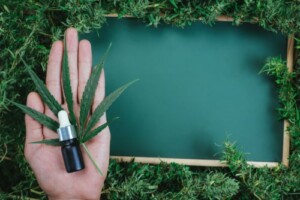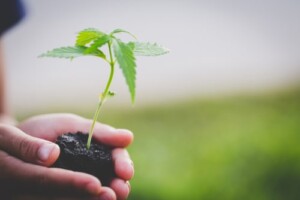The State of Tennessee is one of 17 states with strict cannabis laws, with both recreational and medical marijuana deemed illegal throughout its jurisdiction. And for a while, even hemp was considered prohibited after legislators lumped the herb together with its psychoactive brother. But decades since the great war on drugs, hemp is making a comeback, now deemed to be in a league completely separate from marijuana.
The 2014 and 2018 Farm Bills finally changed the way we see hemp, making the versatile agricultural commodity legal once more throughout the United States. And to finally leverage the economical benefits of the herb, the State of Tennessee has submitted their very own hemp farming program that permits the industrial cultivation of hemp for commercial purposes within the state’s borders. The only questions now are – what’s legal, what’s illegal, and what does that mean for you? Here’s what you need to know.

The big question of legality stems from the fact that both marijuana and hemp share a mother plant. The Cannabis sativa L. plant is the same species that births both of these herbs, and that’s why there was the great cannabis confusion in the first place. However, scientists soon found that a specific chemical compound in marijuana – called delta-9 tetrahydrocannabinol or simply THC – is only present in trace amounts in hemp, and thus the herb doesn’t cause the same psychoactive effects.
This is mainly the result of slight variations in growing conditions, lending changes to the plant’s chemistry. In effect, hemp demonstrates all the benefits of a potent cannabinoid profile minus the intoxicating effects of THC. With that, the 2018 Farm Bill finally lifted the ban on hemp, but not without limitations.
According to the law, legal hemp is any part of the Cannabis sativa L. plant including any of its extracts and derivatives with a THC content of no more than 0.3% per dry weight. Any sample of the plant that exceeds this designated THC concentration shall be considered marijuana, which is illegal throughout the state.
Much like the rest of the country, Tennessee is home to a hodgepodge of hemp sellers left and right. These can range from specialty stores that are dedicated to hemp and CBD products, and retail outlets with various types of products lining their shelves. Then of course, CBD products can also be found in humble gasoline stations, hair salons, and pharmacies where selections might be slim, but viable nonetheless.
For the most part, buyers in search of premium products should direct their efforts towards dedicated CBD stores. Not only do these shops have extensive selections of hemp-derived products, they also usually have helpful personnel with information that can help you choose a proper formulation.
Then of course there’s the internet. Since the 2018 Farm Bill was signed into law, hemp is no longer considered a controlled substance. So, shipping it domestically is completely legal. That said, lots of start-up businesses offering CBD products and hemp-derived formulations have rushed to the web to bring their products to the limelight without having to spend too much of a physical storefront.
One of the things you’ll notice when you scan the selection in a Tennessee based CBD shop is that they have pretty much everything. These include smokable hemp products like raw hemp flower, pre-rolls, cigarettes, cigars, and vape oils. But on top of that, stores will also often offer other product formulations like skin care products, cosmetics, personal care products, and pet care products. The most popular however, and potentially most controversial, is edible CBD.
From granola bars to bottled coffee, the market for CBD-infused food products is far and wide. But just because you can grab a CBD-infused breakfast from your local budtender, doesn’t mean it should be legal. According to the FDA, CBD has yet to be approved as a food additive. So technically, any CBD-infused food should be illegal.
Nonetheless, you’ll see everything from cookies to condiments being infused with CBD and sold to the eager public without any seeming restriction. With that, we can assume that the FDA will soon lay down the law to regulate these products, most likely by determining the limit of the amount of CBD that a manufacturer can incorporate into an edible.

That said, if a law enforcement officer finds you in public using hemp or simply in possession of the herb, they would have no choice but to consider it marijuana. Results for THC lab tests can take a few days at the soonest, so you might have to be charged with a misdemeanor for the meantime, while your stash gets confiscated.
To avoid that kind of unnecessary confrontation, you may want to consider leaving your hemp flower at home. Other alternative CBD formulations may be a good way to enjoy the benefits of hemp without running into an officer. That includes cigarettes, vape oils, and even edibles.
No, you can’t. To make the law clear, the state of Tennessee regulates rooted or growing hemp. That means they oversee any hemp that’s being cultivated, regardless of whether it’s intended for research or commercial use. The purpose of regulating hemp as it grows is because the state wants to guarantee that every ounce produced doesn’t exceed the THC limit. Any hemp that contains more THC than the law specifies will be classified as marijuana, and is illegal for both medical and recreational use.
The problem with growing hemp in your backyard is that there’s no way for the government to take a sample of every harvest and monitor the THC levels the hemp contains. In effect, you might be unknowingly (or deliberately) producing unregulated marijuana. So, to avoid that from happening, the local government in Tennessee prohibits people from growing hemp at home.
Anyone interested in the hemp farming program can apply for a license through the state’s Department of Agriculture. Growing site information, background checks, and fees are some of the requirements necessary to process your request for a license to become a legal hemp farmer within the state.
 The Legality of Hemp in Tennessee
The Legality of Hemp in TennesseeDespite being one of the east coast states that are leaning towards stricter cannabis laws, Tennessee has shifted its views of hemp almost entirely in the past few years. Today, while their hemp market might not be as freeing as those along the west coast, there’s been some drastic changes that allow people to enjoy hemp with greater liberties. Needless to say, the new agricultural commodity is opening up new doors for the Tennessee economy and bringing people the relief they need versus a wealth of daily life’s discomforts.
For Further Reading :
[starbox id=3]

